Charles E W Bean, Diaries, AWM38 3DRL 606/36/1 - December 1915 - January 1916 - Part 6
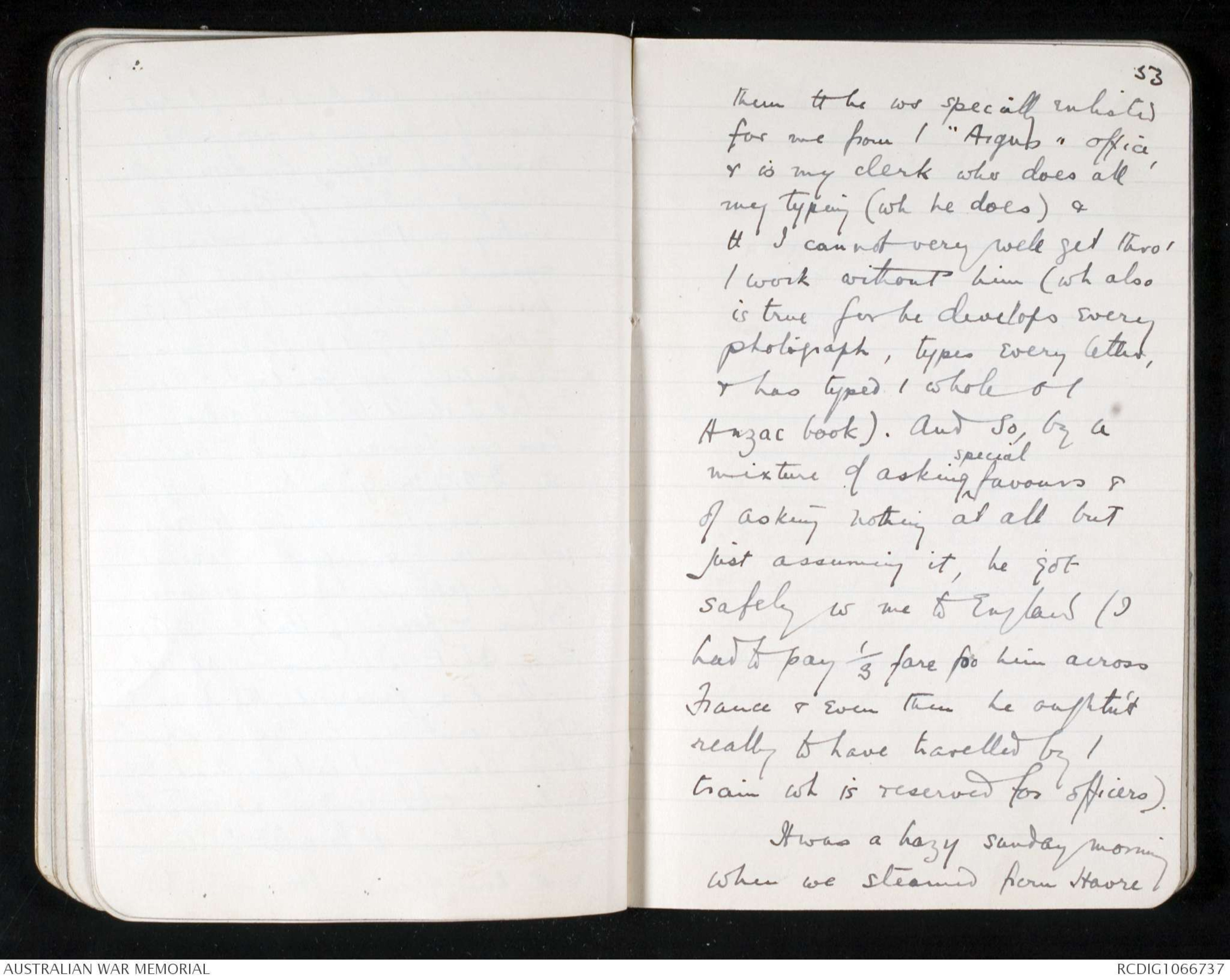
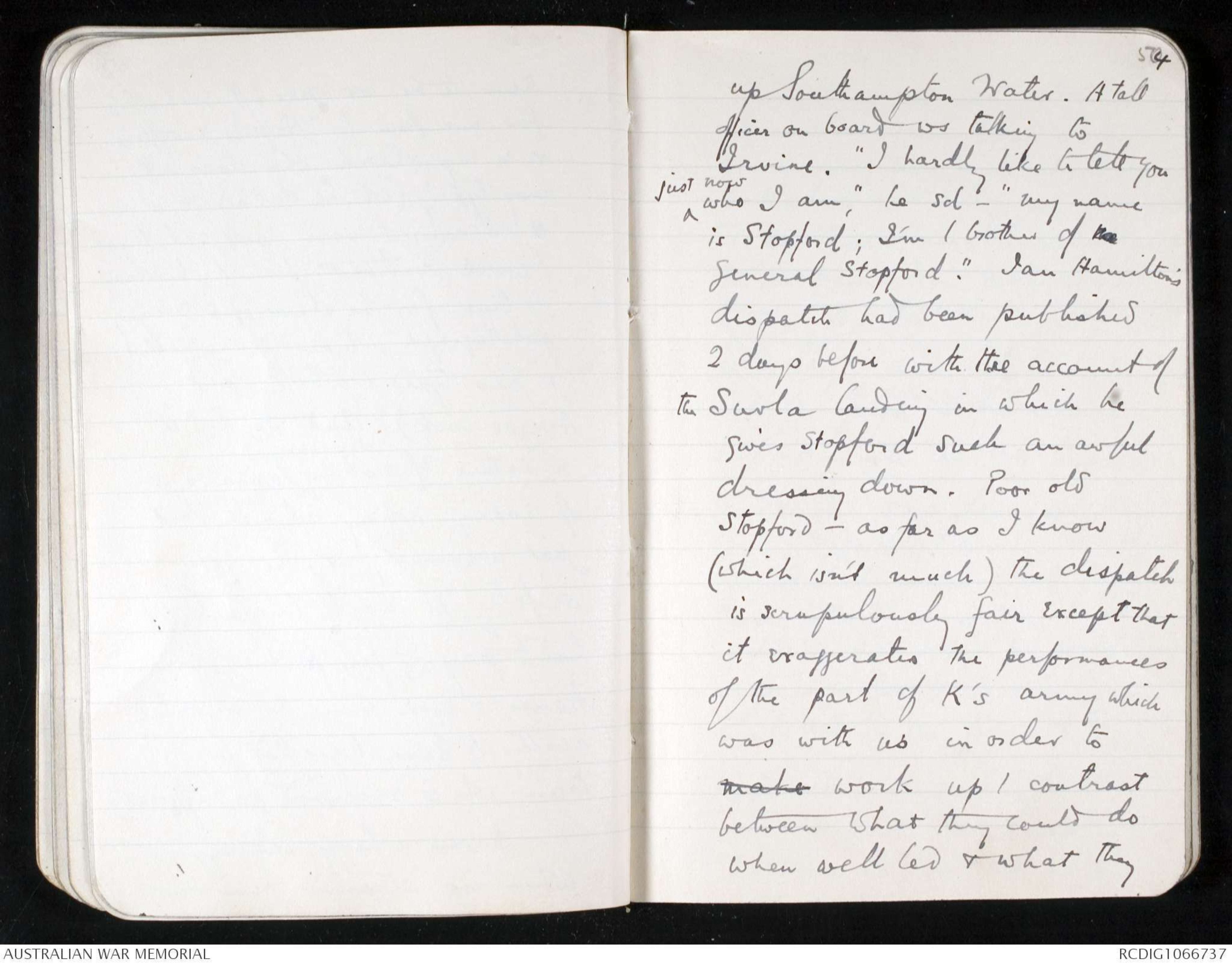
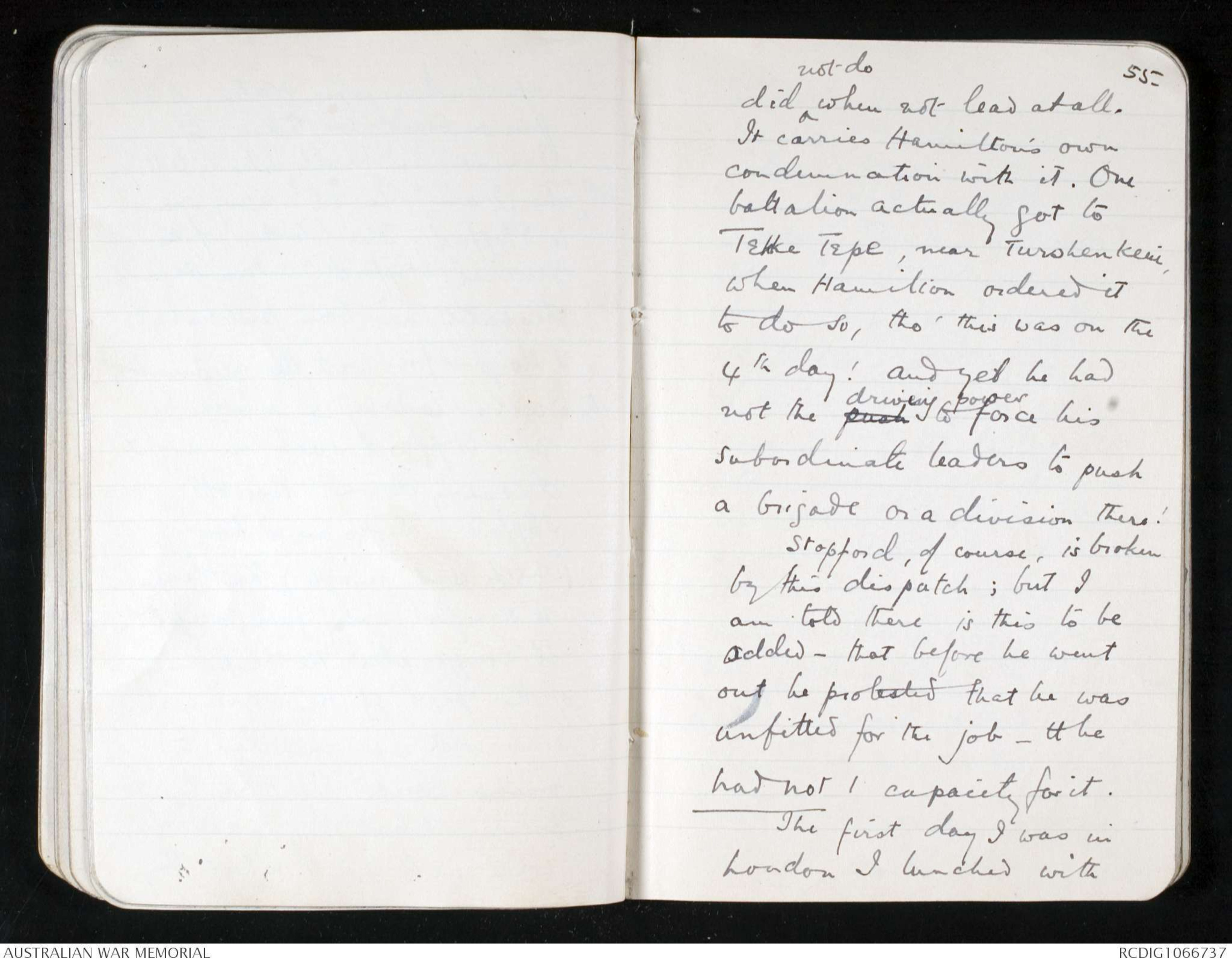
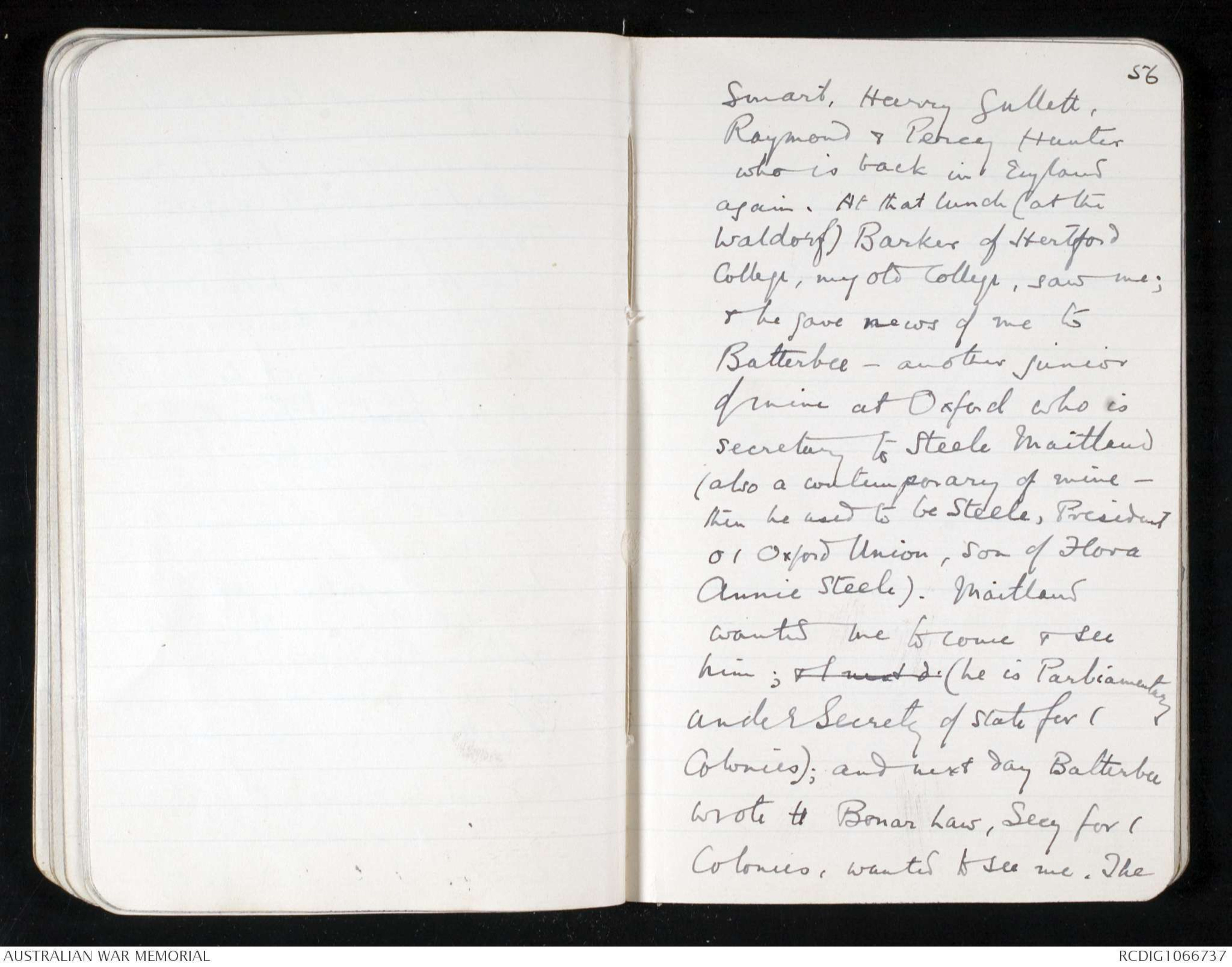
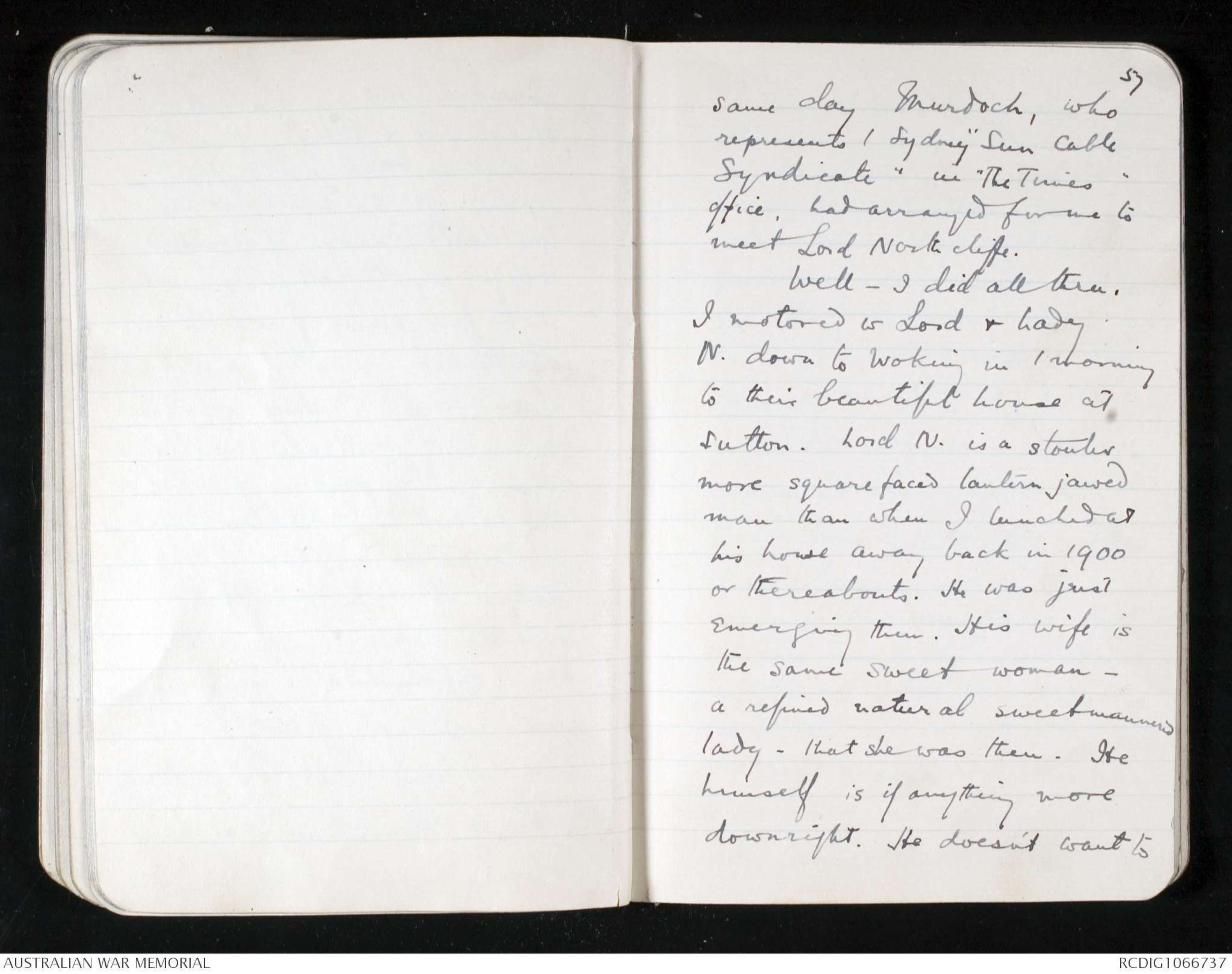
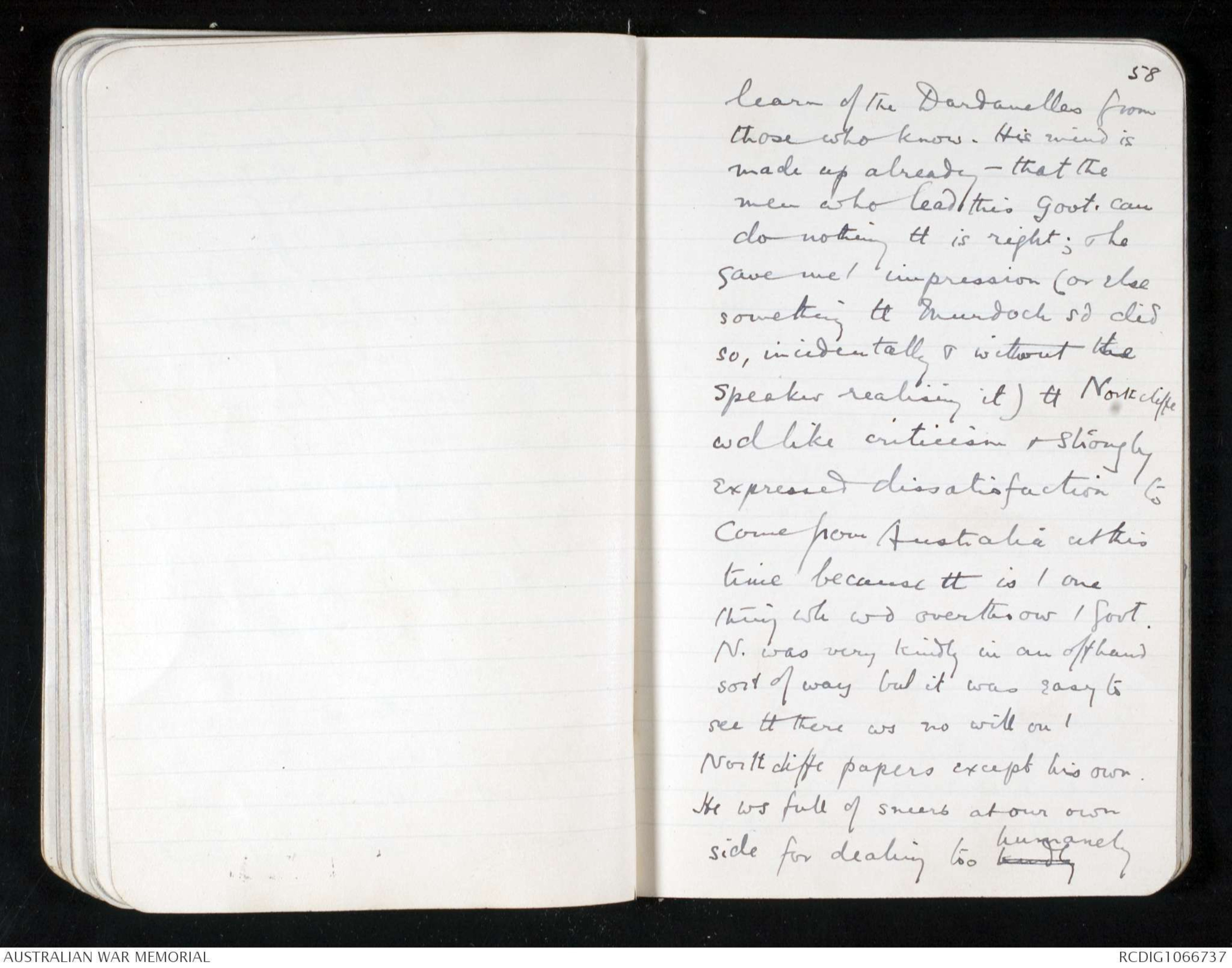
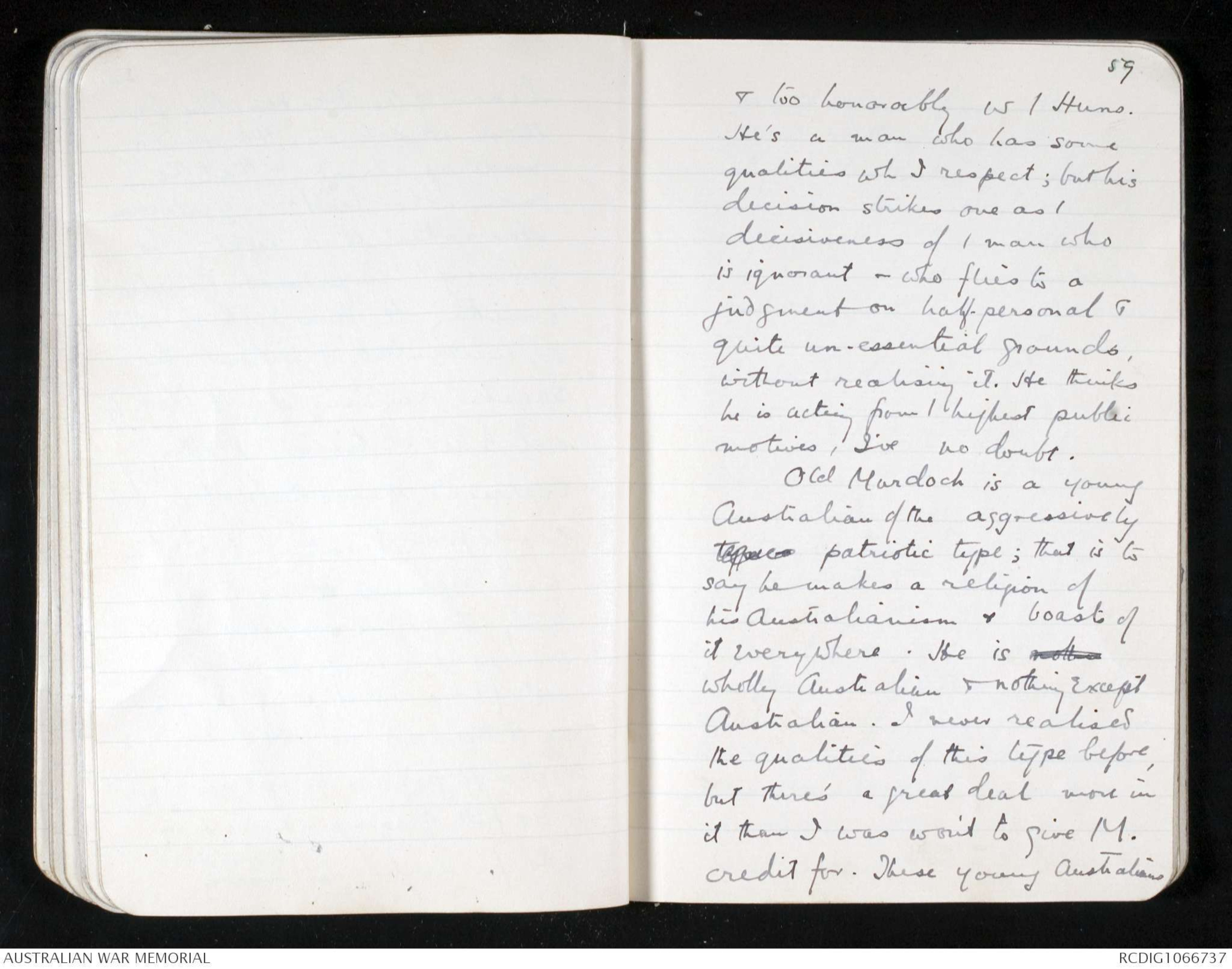
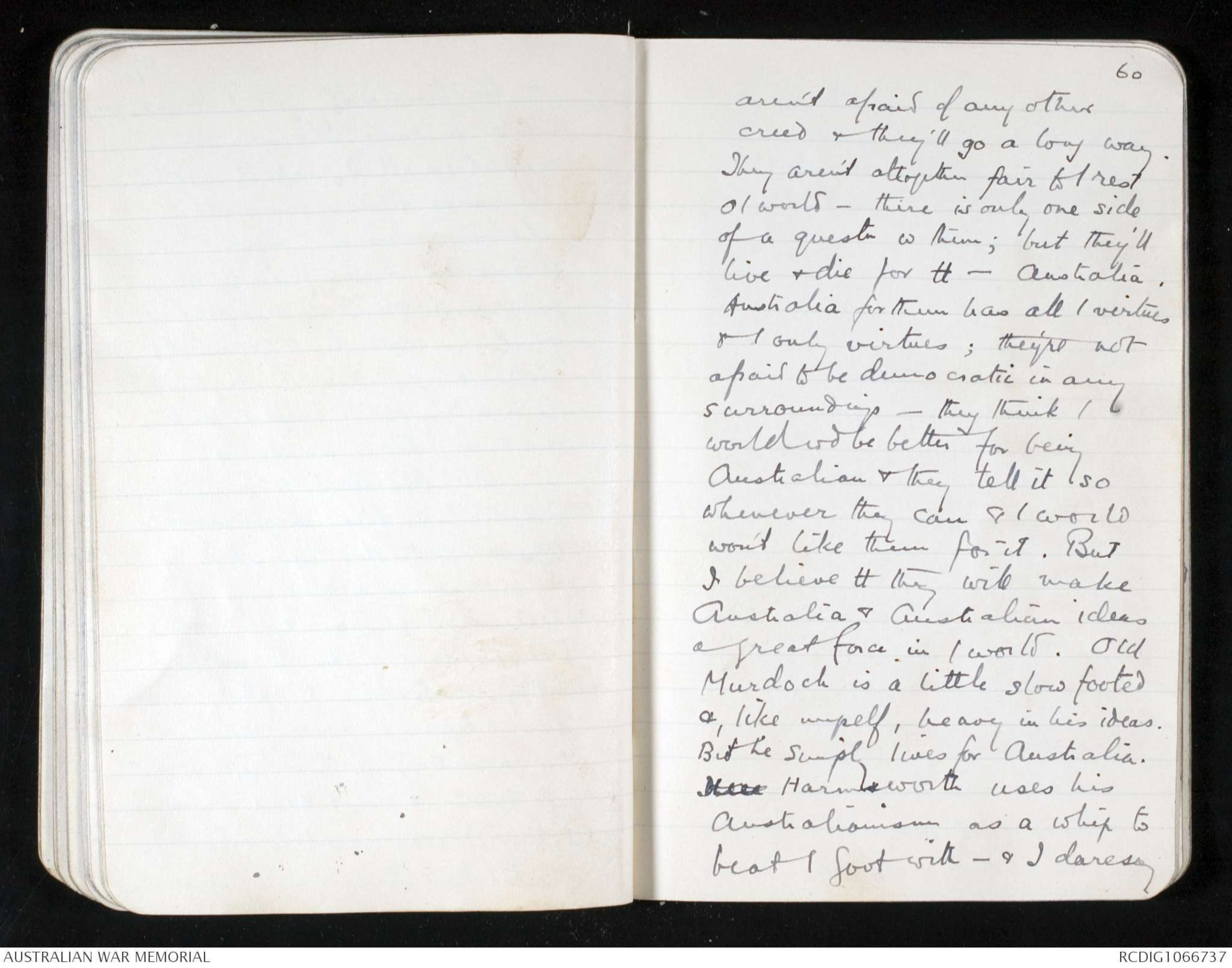
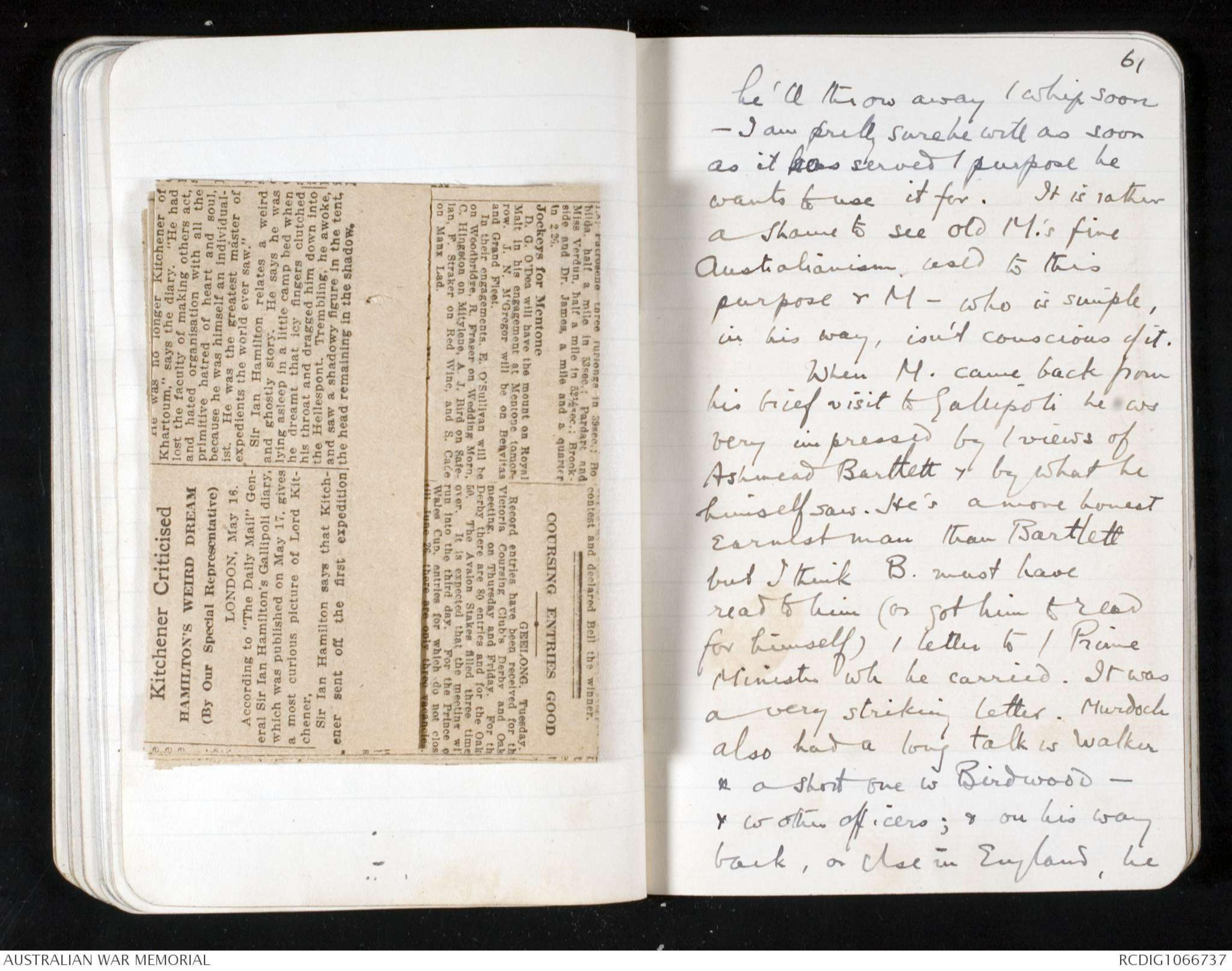

53
them tt he ws specially enlisted
for me from / "Argus" office,
& is my clerk who does all
my typing (wh he does) &
tt I cannot very well get thro'
/ work without him (wh also
is true for he develops every
photograph, types every letter,
& has typed / whole o /
Anzac book). And so, by a
mixture of asking ^special favours &
of asking nothing at all but
just assuming it, he got
safely w me to England (I
had to pay 1/3 fare for him across
France & even then he oughtn't
really to have travelled by /
train wh is reserved for officers).
It was a hazy Sunday morning
when we steamed from Havre
54
up Southampton Water. A tall
officer on board ws talking to
Irvine. "I hardly like to tell you
^just now who I am," he sd - "my name
is Stopford; I'm / brother of the
General Stopford." Ian Hamilton's
dispatch had been published
2 days before with the account of
the Suvla landing in which he
gives Stopford such an awful
dressing down. Poor old
Stopford - as far as I know
(which isn't much) the dispatch
is scrupulously fair except that
it exaggerates the performances
of the part of K's army which
was with us in order tomake work up / contrast
between what they could do
when well led & what they
55
did ^not do when not lead at all.
It carries Hamilton's own
condemnation with it. One
battalion actually got to
Tekke Tepe, near Turshenkeni,
when Hamiton ordered it
to do so, tho' this was on the
4th day! And yet he had
not the driving power push to force his
subordinate leaders to push
a brigade or a division there!
Stopford, of course, is broken
by this dispatch; but I
am told there is this to be
added - that before he went
out he protested that he was
unfitted for the job - tt he
had not / capacity for it.
The first day I was in
London I lunched with
56
Smart, Harry Gullett,
Raymond & Percy Hunter
who is back in England
again. At that lunch (at the
Waldorf) Barker of Hertford
College, my old College, saw me;
& he gave news of me to
Batterbee - another junior
of mine at Oxford who is
secretary to Steele Maitland
(also a contemporary of mine -
then he used to be Steele, President
o / Oxford Union, son of Flora
Annie Steele). Maitland
wanted me to come & see
him; & I must d (he is Parliamentary
Under Secrety of State for /
Colonies); and next day Batterbee
wrote tt Bonar Law, Secy for /
Colonies, wanted to see me. The
57
same day Murdoch, who
represents / Sydney "Sun Cable
Syndicate" in "The Times"
office, had arranged for me to
meet Lord Northcliffe.
Well - I did all three.
I motored w Lord & Lady
N. down to Woking in in / morning
to their beautiful house at
Sutton. Lord N. is a stouter
more squarefaced lantern jawed
man than when I lunched at
his house away back in 1900
or thereabouts. He was just
emerging then. His wife is
the same sweet woman -
a refined natural sweet mannered
lady - that she was then. He
himself is if anything more
downright. He doesn't want to
58
learn of the Dardenelles from
those who know. His mind is
made up already - that the
men who lead this Govt. can
do nothing tt is right; & he
gave me / impression (or else
something tt Murdoch sd did
so, incidentally & without the
speaker realising it) tt Northcliffe
wd like criticism & strongly
expressed dissatisfaction to
come from Australia at this
time because tt is / one
thing wh wd overthrow / Govt.
N. was very kindly in an offhand
sort of way but it was easy to
see tt there ws no will on /
Northcliffe papers except his own.
He ws full of sneers at our own
side for dealing too humanely kindly
59
& too honorably w / Huns.
He's a man who has some
qualities wh I respect; but his
decision strikes one as /
decisiveness of / man who
is ignorant - who flies to a
judgment on half personal &
quite un-essential grounds,
without realising it. He thinks
he is acting from / highest public
motives, I've no doubt.
Old Murdoch is a young
Australian of the aggressivelytype patriotic type; that is to
say he makes a religion of
his Australianism & boasts of
it everywhere. He is nothing
wholly Australian & nothing except
Australian. I never realised
the qualities of this type before,
but there's a great deal more in
it than I was won't to give M.
credit for. These young Australians
60 aren't afraid of any other
creed & they'll go a long way.
They aren't altogether fair to / rest
o / world - there is only one side
of a question w them; but they'll
live & die for tt - Australia.
Australia for them has all / virtues
& / only virtues; they're not
afraid to be democratic in any
surroundings - they think /
world wd be better for being
Australian & they tell it so
whenever they can & / world
won't like them for it. But
I believe tt they will make
Australia & Australian ideas
a great force in / world. Old
Murdoch is a little slow footed
&, like myself, heavy in his ideas.
But he simply lives for Australia.Here Harmsworth uses his
Australianism as a whip to
beat / Govt with - & I daresay
Kitchener Criticised
HAMILTON'S WEIRD DREAM
(By Our Special Representative)
LONDON, May 16.
According to "The Daily Mail" General
Sir Ian Hamilton's Gallipolli diary,
which was published May 17, gives
a most curious picture of Lord
Kitchener.
Sir Ian Hamilton says that Kitchener
sent off the first expedition [...]
He was no longer Kitchener of
Khartoum", says the diary. "He had
lost the faculty of making others act,
and hated the organisation with all the
primitive hatred of heart and soul
because he was himself an individualist.
He was the greatest master of
expeditions the world ever saw."
Sir Ian Hamilton relates a weird
and ghostly story. He says he was
lying asleep in a little camp bed when
he dreamt that icy fingers clutched
his throat and dragged him down into
the Hellespont. Trembling he awoke,
and saw a shadowy figure in the tent.
the head remaining in the shadow.
61
he'll throw away / whip soon
- I am pretty sure he will as soon
as it has served / purpose he
wants to use it for. It is rather
a shame to see old M's fine
Australianism used to this
purpose & M - who is simple,
in his way, isn't conscious of it.
When M. came back from
his brief visit to Gallipoli he ws
very impressed by / views of
Ashmead Bartlett & by what he
himself saw. He's a more honest
earnest man than Bartlett
but I think B. must have
read to him (or got him to read
for himself) / letter to / Prime
Minister wh he carried. It was
a very striking letter. Murdoch
also had a long talk w Walker
& a short one w Birdwood -
& w other officers; & on his way
back, or else in England, he
Melbourne Herald
ty-first Year
ESDAY EVENING, MAY 18, 1920.
SIR IAN HAMILTON ANSWERED
Keith Murdoch Replies to Critic
Report Fully Supported by British Cabinet
and General Munro.
In reply to statements concerning him made by General Sir Ian
Hamilton in his Gallipoli diary, Mr Keith Murdoch, our Special
Representative, who is touring the Dominions with the Prince of
Wales, has cabled the following from Christchurch (N.Z.):-
The facts are these. In September the Dardanelles expedition
had reached the most desperate of its crises. The offensives of
August, though delivered, Mr Bonar Law told me, by more divisions
than General Sir Ian Hamilton had said were necessary to
win a complete victory, had utterly failed. The troops were
exhausted. Few fresh Australian and New Zealand troops were
coming forward, and Sir Ian Hamilton was using them up in isolated
offensives and frontal assaults against strongly entrenched positions,
which brought a heavy expense in life, without, in the opinion
of those with whom I was in contact, gaining the slightest advantage.
Part of our new Fifth Australian Brigade was thrown in, for
instance, against Hill 60, which was not vital to us, and lost frightfully.
We were suffering 1000 casualties a day, including losses
from sickness. Bulgaria was entering the war, and, for the first
time, our forces were going to be up against big guns sent through
from Germany. Winter was coming on and most of the men were
still in the rags of their summer clothing. The poorness of supplies
was in keeping with the lack of support from London.
The Vital Thing: A Fresh Mind
I have a perfectly clear conscience as to what I did. I went to
London and hit Sir Ian Hamilton as hard as I possibly could. I
thought the vital thing was to get a fresh mind on the spot. The
British Cabinet confirmed this view by recalling him with a week
of my report being discussed by it, and he was not again employed.
Sir Ian Hamilton misquotes one of many sentences I wrote about
General Sir William Birdwood. I think Sir William will agree that
I served him at times with hard work during the war, and that I
showed my judgement of his leadership. The sentence misquoted by
Sir Ian was my frank opinion, and I thought it was necessary to state it,
because the recall of General Hamilton would leave a big possibility
of General Birdwood being appointed in his place, especially as Lord
Kitchener was a tremendous believer in General Birdwood.
The truly essential thing was a fresh mind. Had General Birdwood
been appointed, the evacuation would not have come off.
General Hamilton was dangerous because he declared time and again
that an evacuation was unthinkable. General Birdwood was dangerous
in the chief command, because later on, when Sir Charles Monro
went out, he was the only corps commander who declared against
the evacuation, and the reason he gave was the moral effect on
British prestige in India.
Confidence of Two Cabinets
Sir Ian now says that I hit him below the belt. The violence
of his language after four years is evidence of the hardness of the
blow. That makes me glad, but it was a square and fair blow. As
he says, I had the confidence of not only the Australian Cabinet but
also the British Cabinet. The way they had been kept in the dark
about the troops of Gallipoli remains in my mind one of the worst,
because one of the most dishonest, incidents in the muddling of
those days.
I began with Sir Edward Carson, who was then chairman of the
Dardanelles Committee, and Sir Edward put me through a cross-
examination at breakfast before he accepted my statements. Sir
Edward is a good lawyer. He reminded me just the other day of that
strange interview. He took the facts to Cabinet, and I was invited
to meet nearly every member singly, and I met the all excepting
Mr Asquith, then Prime Minister, to whom I had a letter
from Mr Fisher, the Australian Prime Minister, but he broke two
appointments. Mr Asquith was, of course, deeply committed in regard
to the expedition.
The most pregnant interviews were with Mr. Lloyd George and
Mr Bonar Law. The former said to me: "Your are writing to Mr.
Fisher?" I said I was. He said: "Then, it is your duty to let
Mr. Asquith have a copy of your letter for the British Cabinet."
I sent to Mr. Asquith a copy of a very long letter I had written
to Mr. Fisher (for himself, Mr. Hughes and Senator Pearce), and
it was printed as a secret paper by Mr. Asquith. I shall never
regret that it was acted upon. As for its general accuracy I am
quite prepared to have it published and criticised. A Cabinet
Minister later told me that Sir Charles Monro's report bore out
my report, with a striking similarity as to the main facts, and within
a very few days of this report the troops were off the Peninsula.
Censorship Rules Observed
Now as to Sir Ian's charges. I broke no censorship pledge. I
was on Gallipoli partly as a newspaper correspondent and in this
connection I took the correspondents' pledge and kept it explicitly.
I was also there as a representative of the Commonwealth Government,
which had given me a commission of inquiry into certain
phases of administration. I wrote nothing for publication without
censorship. I wrote a report for the Prime Minister of my own country,
and received his thanks and the thanks of the succeeding Prime
Minister (Mr Hughes). There was nothing in the pledge forbidding
that. How could there be, when Sir Ian Hamilton himself knew that
I had come to write reports for the Australian Government? That
report was vital to the situation, and it compelled the wavering and
hesitant Coalition Government to make up its mind and send out General
Sir Charles Monro and Lord Kitchener, who both at once agreed
that evacuation was necessary.
I have met many generals at the front during the war and never
heard one question the absolute necessity of evacuation.
As to my war record, I leave that to the Australian Army, to
whom I devoted myself through the rest of the war as completely
and unquestionably as I did when openly and squarely, for their sake,
and knowing what they thought as I did, I took the action, for which I
now have to bear a general rebuke. General Hamilton's statement
that I said anything to him on this point is a fabrication, and so is
his statement that I thought the Turk a better man than those fighting
him. I understand why he invents these, but what puzzles me is
why he refers to me as his "guest" when I was not.
The Gallipoli Diary
Kitchener Criticised
HAMILTON'S WEIRD DREAM
(By Our Special Representative)
LONDON, May 16.
According to "The Daily Mail" General
Sir Ian Hamilton's Gallipoli diary,
which was published May 17, gives
a most curious picture of Lord
Kitchener.
Sir Ian Hamilton says that Kitchener sent off the first expedition
almost without instructions and then
persistently ignored its needs.
"He was no longer Kitchener of
Khartoum", says the diary. "He had
lost the faculty of making others act,
and hated the organisation with all the
primitive hatred of heart and soul
because he was himself an individualist.
He was the greatest master of
expeditions the world ever saw."
Sir Ian Hamilton relates a weird
and ghostly story. He says he was
lying asleep in a little camp bed when
he dreamt that icy fingers clutched
his throat and dragged him down into
the Hellespont. Trembling he awoke,
and saw a shadowy figure in the tent.
the head remaining in the shadow.
 Deb Parkinson
Deb ParkinsonThis transcription item is now locked to you for editing. To release the lock either Save your changes or Cancel.
This lock will be automatically released after 60 minutes of inactivity.